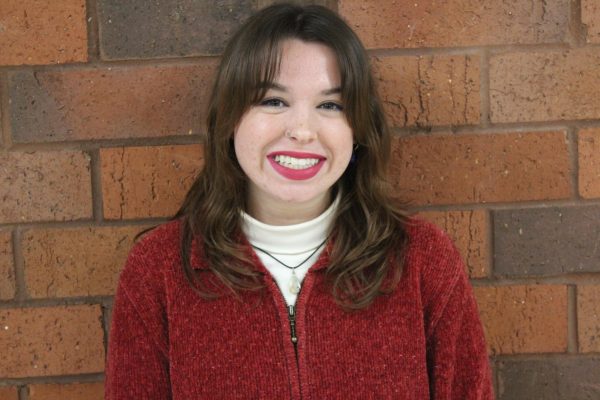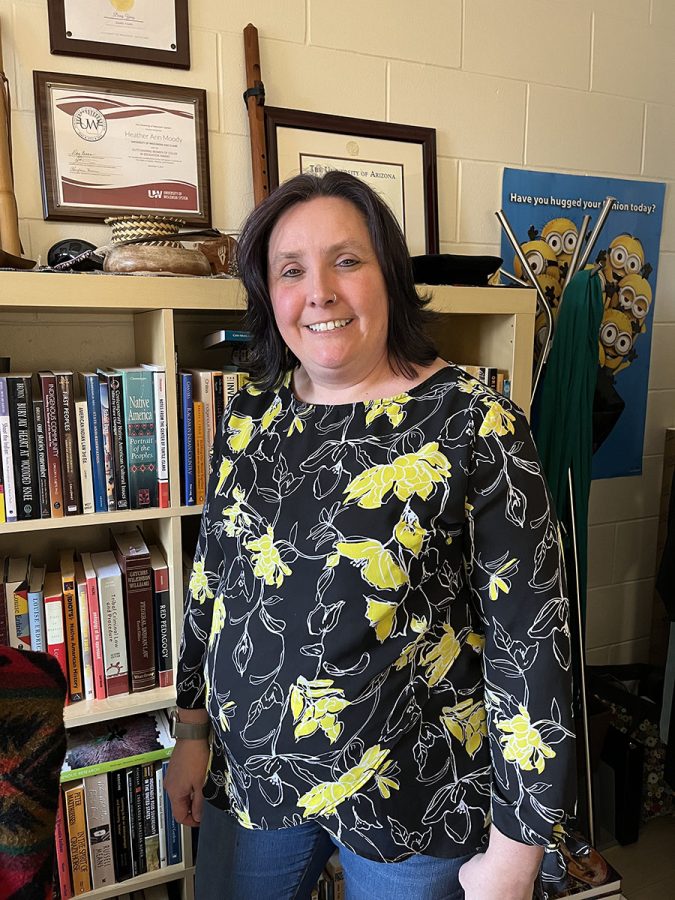Heather Ann Moody receives the MLK Social Justice Leadership award
American Indian Studies director awarded for outstanding social justice and advocacy work
Photo by Ella Freeman
Heather Ann Moody in her office in Hibbard.
Editor’s note: Heather Ann Moody uses she/they pronouns, but for clarification purposes, she/her pronouns will be featured.
Heather Ann Moody, director of the American Indian Studies program at UW-Eau Claire, received the MLK Social Justice Leadership award during the campus Martin Luther King Jr. celebration on Feb. 7.
The MLK Social Justice Leadership Award recognizes a campus community member who has shown ongoing exceptional advocacy work for underrepresented groups through their leadership and actions.
Moody is an alum of UW-Eau Claire and earned her undergraduate in American Indian Studies with a minor in anthropology. She also has a master of arts from the University of Arizona in American Indian Studies. She continued her education by earning a museum studies certificate from UW-Milwaukee and a doctorate of education in teaching and learning from the University of Duluth.
Moody is now the director of the program that began her educational journey.
“It was a big honor to be brought back, it was just one of those things where it felt like the right thing to do,” Moody said. “There was a good community and I always felt respected by my professors in the program, and then to have that honor to work alongside them as their colleague was an amazing experience.”
Moody said being the director of the American Indian Studies program gives her a unique opportunity to change and grow the program.
“Being able to advance the program in a different way, but also to get back to some of our roots because we are actually rooted in assisting native students and really kind of recentering things and coming back to what our students need in the 21st century,” Moody said.
Moody believes that her role as director of the American Indian Studies program at UW-Eau Claire allows her to have a bigger voice.
“When you’re the director and the leader everything always comes back to the program, so does that change how I approach things?” Moody said. “No, because I want my program to reflect a certain value system, and that’s not going to quiet me because we have been quiet too long, we have been silenced too long.”
“We are small but we’re trying to be mighty and when we come together we can do really good things,” Moody said.
Moody teaches several courses as an associate professor and created the course Introduction to Contemporary American Indian Communities.
“Native people are still here, we talk about things that are happening right now,” Moody said.
Beyond being the director of the American Indian Studies program and an associate professor, Moody is the co-advisor for the Intertribal Student Council, this role allows her to support students, “if you feel welcome and belonging you’re going to stay here.”
She is also the tribal consultation policy lead on campus. She was involved with the EDI strategic plan and its development, but she is putting most of her time into the American Indian Studies program.
“Trying to develop our program here is my goal right now,” Moody said.
Moody said she felt honored to receive this award because she considers advocacy a part of her daily life.
“It seems surreal on some level because I am not one for putting myself in the spotlight, it’s very humbling to me to be recognized. I know what I do but I also just do it.” Moody said.
“Even the group that I’m joining of those who have received this before me, those are my role models,” Moody said about all that have come before her in receiving this award. “I need to push that forward, I need to make sure that whoever comes after me, I am helping them.”
For Moody, being an advocate is a part of who she is.
“You are empathic and you see something needs to be done and you just do it,” Moody said. “Sometimes doing the right thing does put you individually at risk. Would I rather lose my job over doing the right thing or just stand in the shadows and let someone be hurt?”
According to Moody, without advocacy and leaders willing to stand up for marginalized groups, nothing will get done.
“If we don’t have advocacy nothing changes,” Moody said. “Advocacy will never end because there will always be that next thing, it’s just a constant thing that should just be a part of life.”
“Just being there for someone because they need to talk something through, we don’t have to be out constantly protesting in the street,” Moody said. “It’s the act of kindness and listening, that’s really important to be an advocate, and just sticking up for what’s right, that takes a lot of courage.”
Lillian Strehlow, who works in risk management and safety and sustainability at UW-Eau Claire, is a former student and now a colleague of Moody.
Strehlow was the one who nominated Moody for the award.
“Moody has had an incredibly positive impact on our campus and I think that impact has extended to students, and especially marginalized students and that is the support we really need here,” Strehlow said.
Strehlow said Moody left a lasting impact on her after she took only one of Moody’s classes.
“I think one thing that students can learn from Moody, besides all the expertise she brings to her classes is how to be a good community member, she doesn’t just show up to class to teach, she supports her community whether it students or other faculty,” Strehlow said.
Teresa O’Halloran, director of Affirmative Action, said Moody was the best choice for the award.
“She has a really good sense of fairness, and then she has her area of scholarship and she really applies that in an impressive way, she’s a very good communicator and works very hard, and she doesn’t shrink from the issues,” O’Halloran said. “She speaks up when speaking up is needed, and that’s important for the community.”
Freeman can be reached at [email protected].

Ella Freeman is a third-year journalism student. This is her fourth semester on The Spectator staff. When she is not attending class or studying Ella can be found in your local antique store, pretending to be mysterious in a coffee shop, or wandering aimlessly in a bookstore.

